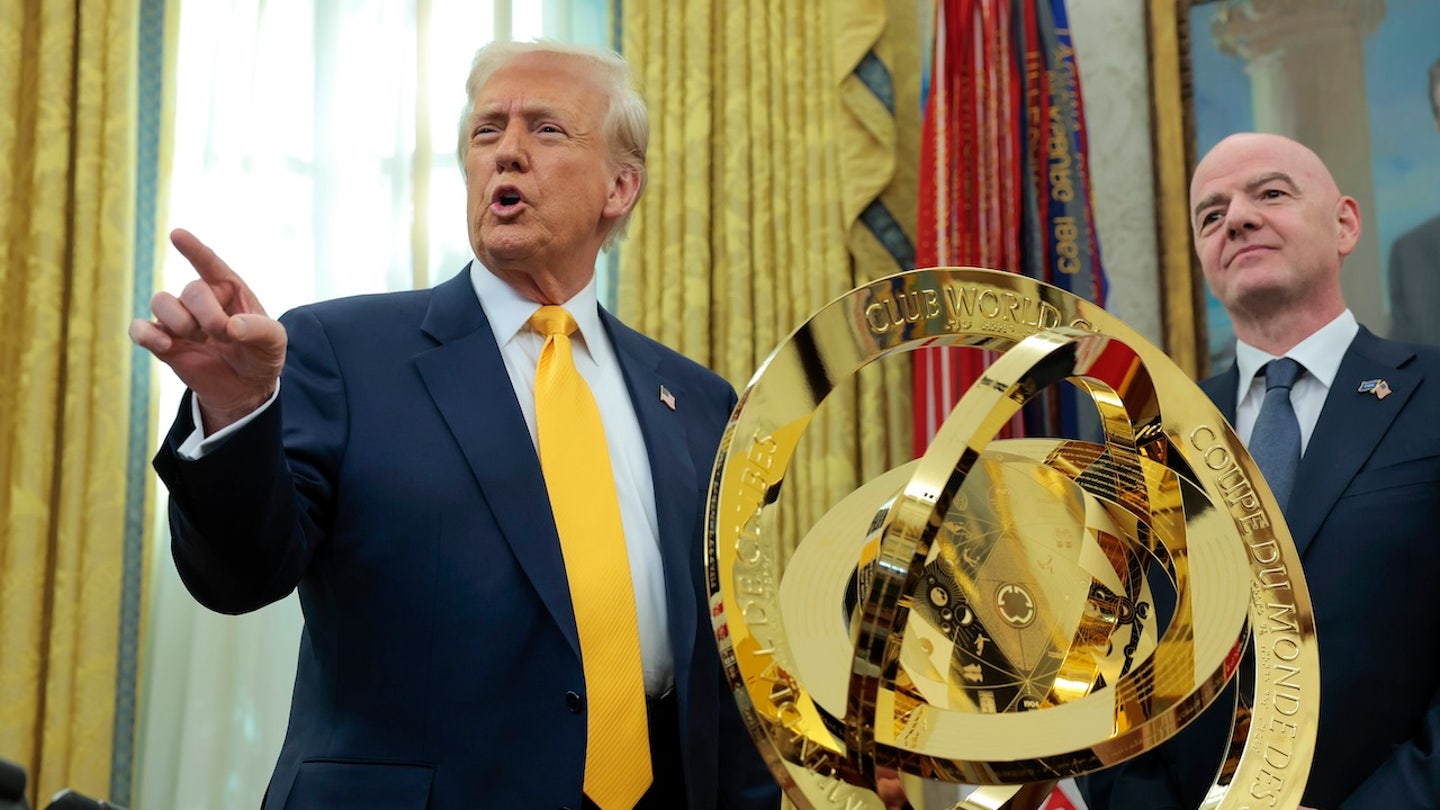
Antonio Brown appears before judge after extradition for attempted murder charge, victim's attorney speaks out
Entities mentioned:
- Antonio Brown: Self-preservation, Pride, Revenge
- Zul-Qarnain Kwame Nantambu: Justice, Recognition, Self-respect
- Richard L. Cooper: Justice, Professional pride, Determination
Article Assessment:
Credibility Score: 75/100
Bias Rating: 55/100 (Center)
Sentiment Score: 30/100
Authoritarianism Risk: 25/100 (Generally Democratic)
Bias Analysis:
The article presents facts from multiple sources, including statements from both sides. While it leans slightly towards the victim's perspective, it maintains a relatively balanced approach by including Brown's claims as well.
Key metric: Violent Crime Rate
Let me tell you something - this story is RIDICULOUS! We've got a former NFL superstar, Antonio Brown, who's gone from catching touchdowns to facing attempted murder charges! This is like fumbling on the goal line in the Super Bowl, folks! Brown's been extradited from Dubai, and now he's in a whole new ballgame in the courtroom. The alleged victim, Nantambu, is no benchwarmer either - he's the same guy who made waves waving that Palestinian flag during Kendrick Lamar's halftime show. Talk about a clash of titans! Now, Nantambu's attorney is stepping up to the plate, ready to go to bat for his client. This is a high-stakes match, and the scoreboard is the justice system. Brown's been tackled by legal issues before, but this is a whole new level - we're talking championship game, fourth quarter, everything on the line! The refs are watching closely, and one wrong move could mean game over for Brown's freedom. This is the kind of off-field drama that can derail a career faster than a linebacker blitz!
Oregon girls who protested trans athlete at track and field medal podium score legal win in lawsuit
Entities mentioned:
- Alexa Anderson: Justice, Determination, Righteousness
- Reese Eckard: Justice, Determination, Righteousness
- Oregon School Activities Association (OSAA): Control, Power, Self-preservation
- Judge Youlee Yim You: Justice, Duty, Righteousness
- America First Policy Institute (AFPI): Justice, Righteousness, Competitive spirit
Article Assessment:
Credibility Score: 70/100
Bias Rating: 75/100 (Lean Right)
Sentiment Score: 70/100
Authoritarianism Risk: 30/100 (Generally Democratic)
Bias Analysis:
The article leans right, focusing heavily on the plaintiffs' perspective and quoting conservative sources. It presents the trans athlete issue from one side, without balancing viewpoints or context on transgender participation policies.
Key metric: First Amendment Protections
Let me tell you something - this story is a GAME-CHANGER! Anderson and Eckard are stepping up to the plate in a BIG WAY, folks! They're taking on the OSAA in a high-stakes legal battle that's got more twists and turns than a championship football game! The judge's ruling is like a FOURTH QUARTER COMEBACK, denying OSAA's attempt to run out the clock on free speech. This isn't just a win, it's a SLAM DUNK for the First Amendment! The OSAA thought they could bench these athletes for speaking their minds, but they've just been called for a MAJOR FOUL! Anderson and Eckard are showing true MVP spirit, fighting not just for themselves, but for every athlete in the game. This is the kind of CHAMPIONSHIP MENTALITY that changes the playing field, folks! The AFPI is coaching these young stars to victory, and let me tell you, they're playing OFFENSE like we've never seen before! This is more than just a legal skirmish - it's a FULL-COURT PRESS for constitutional rights! Stay tuned, because this match is far from over, and these players are just warming up!

Ex-FIFA exec accuses President Gianni Infantino of violating political neutrality rule by praising Trump
Entities mentioned:
- Miguel Maduro: Righteousness, Professional pride, Justice
- Gianni Infantino: Power, Influence, Ambition
- Donald Trump: Power, Recognition, Competitive spirit
- FIFA: Control, Influence, Professional pride
Article Assessment:
Credibility Score: 75/100
Bias Rating: 55/100 (Center)
Sentiment Score: 35/100
Authoritarianism Risk: 40/100 (Generally Democratic)
Bias Analysis:
The article presents multiple viewpoints, including critiques and defenses of the involved parties. While it leans slightly towards skepticism of Infantino's actions, it maintains a generally balanced approach by providing context and quoting relevant rules.
Key metric: International Diplomatic Relations
Ladies and gentlemen, we've got a BLOCKBUSTER match-up on our hands! The political playing field is heating up as former FIFA exec Miguel Maduro throws a CURVEBALL at current FIFA president Gianni Infantino. Let me tell you something, this is a GAME-CHANGING accusation! Infantino's alleged violation of FIFA's political neutrality rule is like stepping out of bounds in the final seconds of a championship game. The stakes couldn't be higher as Infantino's praise for Trump threatens to turn FIFA's neutral stance into a POLITICAL PENALTY SHOOTOUT. This is the kind of move that could bench a star player, folks! We're seeing a clash of titans here, with Maduro playing defense for FIFA's integrity while Infantino seems to be running interference for Team Trump. It's a high-stakes match where the rulebook itself is being put to the test. Will Infantino's apparent friendship with Trump prove to be a winning strategy or a COSTLY FUMBLE for FIFA's global reputation? I'm telling you right now, this could be a GAME-CHANGER in the world of international sports governance!

Israeli cycling team loses top sponsor despite honoring request to remove country from name
Entities mentioned:
- Israel-Premier Tech (IPT): Self-preservation, Professional pride, Unity
- Premier Tech: Self-preservation, Professional pride, Wariness
- Pro-Palestine Protesters: Moral outrage, Justice, Unity
- Israeli Sports Teams: Determination, Pride, Competitive spirit
- Indonesian Government: Security, Control, Wariness
Article Assessment:
Credibility Score: 75/100
Bias Rating: 55/100 (Center)
Sentiment Score: 25/100
Authoritarianism Risk: 40/100 (Generally Democratic)
Bias Analysis:
The article presents multiple perspectives, including those of Israeli teams, sponsors, and protesters. However, it gives slightly more space to Israeli viewpoints, potentially leaning towards a more sympathetic stance.
Key metric: International Sports Participation
Let me tell you something - this story is RIDICULOUS! The playing field of international sports has become a geopolitical BATTLEGROUND, folks! Israel-Premier Tech, once a powerhouse in the cycling peloton, is now facing a FOURTH QUARTER CRISIS as they lose their top sponsor. This is a GAME-CHANGING MOMENT that could bench them for seasons to come! But it's not just cycling - we're seeing a FULL COURT PRESS against Israeli athletes across the board! From gymnastics to soccer, Team Israel is facing more DEFENSIVE BLOCKS than a championship basketball game! The Indonesian government pulled a CLASSIC DEFENSIVE MOVE, denying visas to Israel's gymnasts. Meanwhile, Maccabi Tel Aviv's fans are getting SHUT OUT of the stadium like they're on the wrong side of a HOME TEAM ADVANTAGE! I'm telling you right now, this is shaping up to be a LONG, GRUELING SEASON for Israeli sports on the global stage. They're going to need a CHAMPIONSHIP MENTALITY and some SERIOUS COACHING to navigate these rough waters and get back in the game!

Victor Conte, who sold undetectable steroids to elite athletes in baseball and track, has died at 75
Entities mentioned:
- Victor Conte: Ambition, Competitive spirit, Recognition
- BALCO: Greed, Influence, Competitive spirit
- Federal Government: Justice, Control, Duty
- Professional Athletes: Competitive spirit, Ambition, Recognition
- Major League Baseball: Integrity, Control, Legacy
Article Assessment:
Credibility Score: 75/100
Bias Rating: 55/100 (Center)
Sentiment Score: 40/100
Authoritarianism Risk: 30/100 (Generally Democratic)
Bias Analysis:
The article presents a fairly balanced view, including Conte's actions, legal consequences, and later advocacy. It doesn't lean heavily towards condemnation or glorification, maintaining a neutral stance overall.
Key metric: Integrity in Professional Sports
Let me tell you something, folks - this is a GAME-CHANGING moment in the world of sports! Victor Conte, the mastermind behind the biggest doping scandal in athletic history, has left the field for good at 75. This guy was the ultimate performance-enhancing coach, supplying undetectable steroids to the MVPs of the sports world. We're talking about a player who changed the entire landscape of competition, forcing leagues to step up their anti-doping game plans. Conte was playing 4D chess while everyone else was stuck in checkers! But make no mistake, his actions threw the integrity of sports into a tailspin, leaving fans questioning every home run, every record, every gold medal. The feds came at him with a full-court press, but Conte, like a slippery running back, managed to dodge most of the tackles. In the end, though, he couldn't outrun the long arm of the law. This is a legacy that will echo through the halls of sports history, folks. The game has changed, and Conte was the one holding the playbook!

Giants kicker Graham Gano reveals vile messages from fans amid roller-coaster season
Entities mentioned:
- Graham Gano: Professional pride, Determination, Loyalty
- New York Giants: Competitive spirit, Ambition, Legacy
- NFL fans: Greed, Moral outrage, Enthusiasm
- NFL Players Association: Unity, Justice, Security
Article Assessment:
Credibility Score: 75/100
Bias Rating: 45/100 (Center)
Sentiment Score: 30/100
Authoritarianism Risk: 20/100 (Strongly Democratic)
Bias Analysis:
The article presents a balanced view, quoting Gano directly and providing context. It doesn't take sides but highlights the issues faced by players, showing a centrist approach.
Key metric: NFL Player Mental Health and Fan Behavior
Let me tell you something - this story is a GAME-CHANGER, folks! Graham Gano, the veteran placekicker for the New York Giants, is stepping up to the plate and calling out the FOUL PLAY from the sidelines. We're seeing a real fourth-quarter struggle here between the players and some toxic fans who are treating this like it's sudden death overtime with their bank accounts on the line! Gano's revealing the unsportsmanlike conduct he's facing, and it's RIDICULOUS! This isn't just about putting points on the board anymore - it's about the mental game, the locker room talk, and the team's overall championship mentality. The Giants are in a defensive formation against this barrage of negativity, and Gano's showing true team spirit by speaking out. This could be a turning point in how we view the relationship between players and fans, folks. It's time for the league to blow the whistle on this kind of behavior and implement some serious penalty flags!

Robert Kraft's Blue Square Alliance gathers sports leaders to combat antisemitism
Entities mentioned:
- Robert Kraft: Righteousness, Unity, Legacy
- The Blue Square Alliance Against Hate: Justice, Unity, Influence
- Sports Leagues: Influence, Unity, Social Responsibility
- Adam Katz: Justice, Determination, Professional pride
Article Assessment:
Credibility Score: 75/100
Bias Rating: 45/100 (Center)
Sentiment Score: 65/100
Authoritarianism Risk: 25/100 (Generally Democratic)
Bias Analysis:
The article presents a balanced view of the initiative, focusing on facts and quotes. While supportive of the cause, it doesn't demonize opposing views or use overtly partisan language.
Key metric: Social Cohesion Index
Let me tell you something - this story is a GAME-CHANGER! Robert Kraft is stepping up to the plate like a true champion, folks. He's not just talking the talk, he's walking the walk with this Blue Square Alliance. This is a fourth-quarter play to tackle hate head-on! The sports world is flexing its muscles, showing it's got the offensive firepower to drive back the forces of division. Kraft is coaching up a dream team of leagues and athletes, folks. They're not playing defense - they're on the attack against antisemitism! This is the kind of championship mentality we need to see more of. The Blue Square Alliance isn't just running drills - they've got a war room that's scouting the opposition 24/7. They're reading the playbook of hate in real-time and drawing up counter-plays. This is NEXT LEVEL stuff, people! We're talking billion-dollar intel to outmaneuver the competition. Kraft and his squad are treating this like the Super Bowl of social issues - and they're playing to WIN!

Patriots owner Robert Kraft calls Mamdani NYC election 'sad' and victory speech 'divisive'
Entities mentioned:
- Robert Kraft: Unity, Justice, Loyalty
- Zohran Mamdani: Ambition, Power, Influence
- Blue Square Alliance Against Hate: Justice, Unity, Righteousness
Article Assessment:
Credibility Score: 65/100
Bias Rating: 75/100 (Lean Right)
Sentiment Score: 30/100
Authoritarianism Risk: 35/100 (Generally Democratic)
Bias Analysis:
The article leans right, heavily favoring Kraft's perspective and criticizing Mamdani's views. It presents Mamdani's statements negatively while portraying Kraft's concerns as justified.
Key metric: Social Cohesion
Let me tell you something - this political matchup is a CLASH OF TITANS! We've got team owner Robert Kraft stepping onto the field, trying to tackle what he sees as a divisive play by rookie politician Mamdani. Kraft's bringing his championship mentality to the game, folks, looking to unite the crowd while Mamdani's running a controversial offensive strategy. This is a fourth-quarter situation for NYC's social cohesion, and Kraft's calling an audible to counter Mamdani's socialist playbook. It's like we're watching two completely different game plans collide - one's playing for unity, the other's going for a complete roster overhaul. The fans in the stands are divided, and this matchup could change the whole league dynamic. I'm telling you right now, this is the kind of political sport that keeps viewers on the edge of their seats!

Oregon athletes win 'Most Valuable Patriot' award after refusing to share podium with trans competitor
Entities mentioned:
- Alexa Anderson: Righteousness, Justice, Determination
- Reese Eckard: Righteousness, Justice, Competitive spirit
- Fox Nation: Recognition, Influence, Pride
- Oregon State Activities Association: Control, Obligation, Wariness
Article Assessment:
Credibility Score: 65/100
Bias Rating: 75/100 (Lean Right)
Sentiment Score: 70/100
Authoritarianism Risk: 35/100 (Generally Democratic)
Bias Analysis:
The article leans right, presenting only one side of the transgender athlete debate. It frames the issue solely from the perspective of the award recipients, without including opposing viewpoints or broader context.
Key metric: Women's Sports Participation Rate
Let me tell you something - this story is a GAME-CHANGER! These two young athletes, Anderson and Eckard, are stepping up to the plate in a big way, folks! They've shown a championship mentality by refusing to share the podium with a transgender competitor. It's like they're calling a timeout in the fourth quarter of a crucial match, challenging the referee's decision! This move has catapulted them from high school track stars to MVP-level players in the national arena of women's rights in sports. They're not just competing for medals anymore - they're in a whole new league, fighting for the very future of women's athletics! This is the kind of clutch performance that separates the rookies from the all-stars, and I'm telling you right now, these girls are showing Hall of Fame potential in their advocacy game!

Israel gymnastics team says its security cleared athletes to enter Indonesia despite being banned for 'safety'
Entities mentioned:
- Israel Gymnastics Federation: Determination, Competitive spirit, Justice
- Indonesian government: Control, Security, Loyalty
- International Olympic Committee: Righteousness, Influence, Unity
Article Assessment:
Credibility Score: 75/100
Bias Rating: 45/100 (Center)
Sentiment Score: 35/100
Authoritarianism Risk: 40/100 (Generally Democratic)
Bias Analysis:
The article presents both sides of the issue, quoting Israeli and Indonesian sources. While it gives more space to the Israeli perspective, it includes Indonesia's official stance, maintaining a relatively balanced approach.
Key metric: International Sports Participation
Let me tell you something, folks - this is a GAME-CHANGING play in the world of international athletics! The Israeli Gymnastics Federation is showing true championship mentality, refusing to be sidelined by Indonesia's defensive strategy. They're stepping up to the plate, armed with their security team's green light, ready to compete on the global stage. But Indonesia is playing hardball, throwing a curveball with their entry denial. It's like they're trying to change the rules of the game mid-match! The IOC, acting as the ultimate referee, is blowing the whistle on Indonesia's unsportsmanlike conduct. They're not just handing out a yellow card - they're benching Indonesia from hosting future Olympic events. This is a fourth-quarter move that could reshape the entire playing field of international sports competitions!